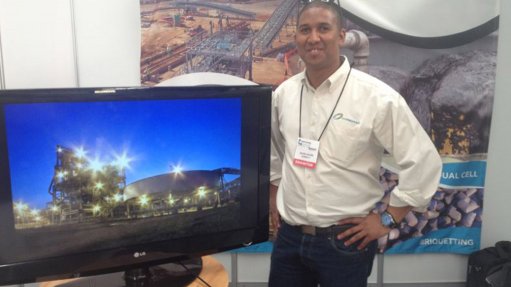
JAYSON JACOBS Chirodzi ultrafine materials are rich in coking coal
Environmental and process technologies company Enprotec has taken on its first cross- border project with the installation of an ultrafines recovery and dewatering plant at Jindal Africa’s Chirodzi coal mine, in Mozambique’s Tete province.
Jindal Africa is the African subsidiary of India-based steelmaker Jindal Steel & Power.
The company used its patented Dual Cell technology and efficient filter presses to recover coking coal from the current waste stream, and dewater the recovered ultrafines to ultimately yield a saleable product.
“This plant will enable the recovery of ultrafines, which will no longer be disposed of as waste,” says Enprotec head of sales Jayson Jacobs, adding that ultrafines recovered by the Enprotec solution will be exported as a coking coal product.
“We will also deploy a second system to recover water in the mine’s filters, which means that Chirodzi mine’s water consumption will be significantly reduced,” he says.
The Enprotec high-pressure filter press will dewater the flotation product to a moisture of between 18% and 20%, subsequently reducing the plant’s raw water consumption by an additional 15% to 25%, states Jacobs.
“Design is currently under way and we plan to complete the project in the next three to six months,” he enthuses.
The Chirodzi main dense-medium separation plant was commissioned in January 2013, owing to the rich presence of coking coal in Chirodzi’s ultrafine material. “It was only a matter of time before a flotation and dewatering plant was implemented,” Jacobs explains.
The contract for the 60 t/h flotation plant and 45 t/h filtration plant at Chirodzi was signed in October 2013. The ground and civil works are currently under way and shipment of the thickener and structural steel to the Chirodzi site has begun, he notes.
“We conducted a full sampling and laboratory campaign prior to project adjucation to determine the project’s feasibility. Each aspect of the plant design was approved to ensure that the client’s standards and expectations were met,” says Jacobs.
“The environmental impact will also be reduced, as most of the material will be recovered,” he says.
Enprotec will treat the Chirodzi project as a full turnkey project, Jacobs says, adding that the company has successfully completed several similar projects in South Africa.
Jacobs further tells Mining Weekly that the company will establish a Mozambique-based office by the end of the first quarter of 2014, which will operate as a sister company to the South Africa-based head office, ensuring more effective technical assistance, with readily available spares, which will increase the plant’s productivity,” he concludes.